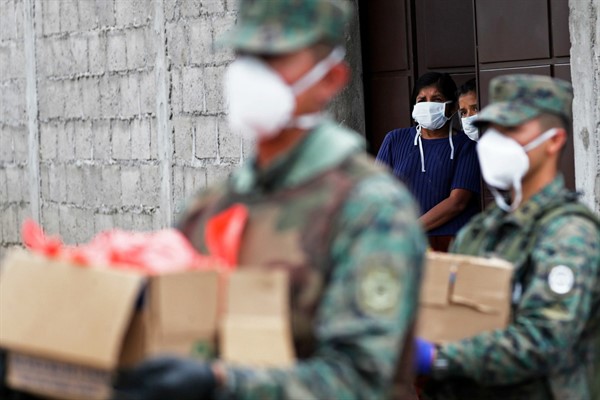Guayaquil, the largest city in Ecuador, has emerged as Latin America’s epicenter in the COVID-19 pandemic. Though smaller in scale than the staggering outbreak in New York City, Guayaquil’s is no less devastating. Its 2.7 million inhabitants are enduring many of the same, wicked challenges that New Yorkers have been facing: a surge in confirmed cases, overwhelmed hospitals and mortuaries, and a national government that is trying to look like it is handling the crisis. Yet one thing is quite different: Guayas, the province surrounding Guayaquil, has been placed under military jurisdiction.
To respond to the spread of the virus, Ecuador’s government declared a national emergency and authorized the creation of a Joint Working Group, led by the navy, to enforce the quarantine and oversee supply chains and general security in Guayas, the country’s most populous province. In a virtual press conference announcing the new group, the commander of the navy reassured Ecuadorians that “the armed forces are not going to repress, they are going to raise awareness.” But then he added: “By reason or by force, we are going to save and preserve the life of our citizens.”
Long a motto used by militaries in Latin America, the phrase “by reason or force” is being deployed again to justify the militarization of state institutions and policies during this time of crisis, as the armed forces take a leading role in implementing and even overseeing strategies to contain the coronavirus pandemic. Political leaders throughout the region are turning to militaries to provide critical resources, logistics and security capabilities that their civilian agencies lack. The crisis has become a way for Latin American militaries to demonstrate their significance as the state’s most versatile provider, and they are likely to gain political clout as a result.

